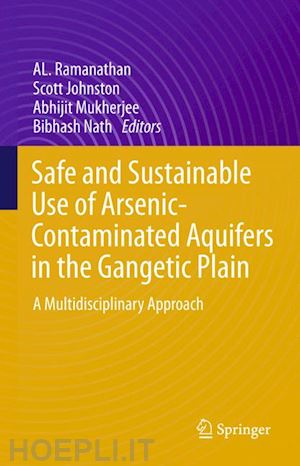
Questo prodotto usufruisce delle SPEDIZIONI GRATIS
selezionando l'opzione Corriere Veloce in fase di ordine.
Pagabile anche con Carta della cultura giovani e del merito, 18App Bonus Cultura e Carta del Docente
This book offers a meaningful and practicable guide to better management of arsenic problems in the groundwater of the Gangetic Plain. It gathers contributions from distinguished researchers who have been actively working in the area for over a decade. The arsenic contamination of groundwater is a growing concern in the central Gangetic Plain, where the local population’s main sources of fresh water are surface water, groundwater and rain water; of these sources, only the last two generally meet the most important criteria for drinking water in their natural state. Natural geological changes are presumed to be the primary reason for arsenic contamination in this region. Further, most of the people living in this area have developed the habit of drinking water (groundwater) from the arsenic-contaminated tubewells in many parts of the region. As a result, many are suffering from arsenicosis and many more are at risk. Since the cause of arsenic contamination in groundwater still remains unclear, this book seeks to address the arsenic issue in this region by pursuing a holistic and systematic scientific approach. Accordingly, it delineates various sources, processes, hypotheses and remedial approaches that are needed to manage the arsenic contamination in the Central Gangetic Plain.
Hydrogeochemical Evolution in the Different Shallow Aquifers of Central Gangetic Plain and Kosi Alluvial Fan and Their Implications for the Distribution of Groundwater Arsenic.-Assessment of Subsurface Lithology by Resistivity Survey Coupled with Hydrochemical Study to Identify Arsenic Distribution Pattern in Central Gangetic Plain: A Case Study of Bhagalpur District, Bihar, India.- Arsenic Contamination in Groundwater in the Middle Gangetic Plain, India: Its Relations to Fluvial Geomorphology and Quaternary Stratigraphy.- Preliminary Assessment of Arsenic Distribution in Brahmaputra River Basin of India Based on Examination of 56,180 Public Groundwater Wells.- Problem, Perspective and Challenges of Arsenic Contamination in the Groundwater of Brahmaputra Flood Plains and Barak Valley Regions of Assam, India.- Arsenic Contamination of Groundwater in Barak Valley, Assam, India: Topography-based Analysis and Risk Assessment.- Hydrogeochemistry and Arsenic Distribution in the Gorakhpur District in the Middle Gangetic Plain, India.- Arsenic Distribution and Mobilization: A Case Study of Three Districts of Uttar Pradesh and Bihar (India).- Understanding Hydrogeochemical Processes Governing Arsenic Contamination and Seasonal Variation in the Groundwater of Buxar District, Bihar, India.- Chemical Characteristics of Arsenic Contaminated Groundwater in Parts of Middle-Gangetic Plain (MGP) in Bihar, India.- An Insight into the Spatio-vertical Heterogeneity of Dissolved Arsenic in Part of the Bengal Delta Plain Aquifer in West Bengal (India).- Surface Generated Organic Matter: An Important Driver for Arsenic Mobilization in Bengal Delta Plain.- A Comparative Study on the Arsenic Levels in Groundwaters of Gangetic Alluvium and Coastal Aquifers in India .- Groundwater Arsenic Contamination in Bengal Delta and ItsHealth Effects.- Impact of Arsenic Contaminated Irrigation Water on Some Edible Crops in the Fluvial Plains of Bihar.- A Greenhouse Pot Experiment to Study Arsenic Accumulation in Rice Varieties Selected from Gangetic Bengal, India.- Status of Arsenic Contamination along the Gangetic Plain of Ballia and Kanpur Districts, Uttar Pradesh, India and Possible Remedial Measures.- A Low-cost Arsenic Removal Method for Application in the Brahmaputra-Ganga Plains: Arsiron Nilogon.- Index.











Il sito utilizza cookie ed altri strumenti di tracciamento che raccolgono informazioni dal dispositivo dell’utente. Oltre ai cookie tecnici ed analitici aggregati, strettamente necessari per il funzionamento di questo sito web, previo consenso dell’utente possono essere installati cookie di profilazione e marketing e cookie dei social media. Cliccando su “Accetto tutti i cookie” saranno attivate tutte le categorie di cookie. Per accettare solo deterninate categorie di cookie, cliccare invece su “Impostazioni cookie”. Chiudendo il banner o continuando a navigare saranno installati solo cookie tecnici. Per maggiori dettagli, consultare la Cookie Policy.